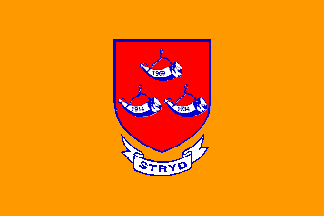
This page is part of © FOTW Flags Of The World website
Herstigte Nasionale Party (South Africa)
HNP
Last modified: 2022-10-22 by bruce berry
Keywords: herstigte nasionale party | south africa | politics |
Links: FOTW homepage |
search |
disclaimer and copyright |
write us |
mirrors
 image
by Gary Selikow, 02 Feb 2005
image
by Gary Selikow, 02 Feb 2005
See also:
Herstigte Nasionale Party (HNP)
Here is the logo of the of the Herstigte Nasionale Party (HNP)
(Re-constructed National Party of South Africa), an ultra-conservative
Afrikaner Party in South Africa shown on this website
http://www.hnp.org.za/
hnp.gif) image from this website, reported by
Gary Selikow, 02 Feb 2005
image from this website, reported by
Gary Selikow, 02 Feb 2005
The logo at the top left of the three powder horns on the red shield
is flown on an orange flag.
Gary Selikow, 02 Feb 2005
The correct translation for 'Herstigte' into English would be
'Re-established' - thus the Re-established National Party
Andre Burgers, 02 Feb 2005
The three so-called 'powder horns' were most likely taken from the Arms of the
Orange Free State Republic. They were not powder horns at all but the bugle
horns of the House of Orange after whom the republic was indirectly named. The
name came from the Orange River which was named after the House of Orange and in
1854 the newly established republic approached King Willem III of the
Netherlands for the grant of a arms and a flag. As far as I know still the
only case in history where a republic has asked a monarch for such a grant.
Although not strictly flag related, it might be enlightening to give a potted
history of South African political parties during the last century so that we
will know where the HNP fits into the picture.
When the
Union of South Africa was formed in in 1910
from the two British colonies of the
Cape and
Natal as well as the two former Boer republics of the
Transvaal and the
Orange Free
State, the Afrikaner parties in the former republics and the Cape allied with
moderate English parties in the former colonies, formed the South African Party
(SAP) which in turn formed the first Union government under the premiership of
General Louis Botha (former Boer Commander in Chief). In 1912, Gen JBM Hertzog
broke away from the SAP of Gen. Louis Botha on questions of policy with respect
to relations with Britain and in 1914 formed the National Party
for Afrikaners. The NP won
the 1924 elections allied with the English Labour Party to form the so-called
Pact government. The Pact stayed in power until 1933 when the world wide
economic crises and a severe three year drought in the country forced Hertzog
and Jan Smuts (who had succeeded Botha as leader of the SAP) to form a national
coalition government. The NP and the SAP fused in 1935 to form the United South
African National Party, subsequently known simply as the United Party (UP),
under the leadership of Hertzog with Smuts as his deputy. A part of the NP under
Dr DF Malan refused to join in the fusion and broke away to form the 'Gesuiwerde'
National Party (that is the 'purified' NP). The outbreak of World War II caused
the UP to split on the question of South Africa's participation. Smuts was of
the opinion that SA, as a member of the British Empire, was automatically at war
with Germany. Hertzog was of the opinion that the war was a European
matter and that South Africa should remain neutral. Parliament voted on 06
September 1939 in favour of Smuts by 11 votes and Hertzog had to resign. He
broke away from the UP to form the Afrikaner Party. After his death, in 1941,
his party now
under the leadership of NJ Havenga, joined with the Gesuiwerdes to form the 'Herenigde'
National Party (that is the 'Re-united' National Party or HNP). After defeating
Smuts in the 1948 elections, the HNP resumed the old name of National Party.
This party ruled the country until 1994 when the ANC of
Nelson Mandela took over. In the early 1970s the NP started easing off slightly
on the previously rigorously applied apartheid policies which caused its extreme
right wing under Albert Hertzog (son of the old general) to break away to form
the 'Herstigte' National Party or 'Re-established' NP.
Now they are all history.
Andre Burgers, 04 Feb 2005
According to Philip Rault's paper on Afrikaner Political
Flags presented at the XVII International Congress of Vexillology in Cape
Town (1997) the HNP used a simple tricolour of orange, white and black.
Having its origins as a breakaway group from the National Party in 1969, the HNP
as with the Conservative Party, wished to stay as close to the traditional NP colours of orange, white and blue. Orange white and green were considered
because of the green in the Transvaal flag but the green was rejected in favor
of black because it was closer to the blue than green and with the black/white
contrast it suggested something of the political situation in South Africa.
Rault goes on further to say that sometimes the HNP flag design was adorned with
letters and slogans on stickers, letterheads, shirts etc. but never on actual
flags.
Bruce Berry, 06 Feb 2005